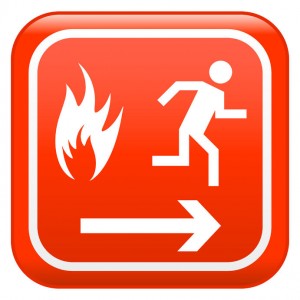 No one wants to be forced to evacuate, but you can minimize your anxiety if you think you may have to, by having a good evacuation plan in place. If the time comes and you really do have to flee your home, you can make the experience more comfortable and save your most important possessions, if you have planned ahead and prepared. A good evacuation plan can even save your life.
No one wants to be forced to evacuate, but you can minimize your anxiety if you think you may have to, by having a good evacuation plan in place. If the time comes and you really do have to flee your home, you can make the experience more comfortable and save your most important possessions, if you have planned ahead and prepared. A good evacuation plan can even save your life.
- Learn about your community’s evacuation plan, and how they will let residents know when it is time to get out.
- Identify multiple escape routes, and practice them.
- Create a family communication plan. Designate a friend or relative who lives out of the area to be a central contact for all family members. Make sure that each family member has that person’s contact information on them at all times if you think you may have to evacuate, even children who are too young to make the call for themselves.
- Whether you must be away from home overnight or for an extended period of time, figure out where you will stay. You may want to choose a short-term and long-term place to stay.
- If you plan to go to a shelter, locate several ahead of time. Your shelter of choice may be full or may be closed if the evacuation area expands, so be sure to select alternatives and know how to find them when the time comes.
- If you have pets, make sure you find a shelter that will accept them. Many don’t allow pets. However, all shelters must allow service animals.
- If you do not have your own reliable transportation, make a plan for who you will ride with and how you will get in touch.
- If you plan to use your own vehicle, keep it fueled up and parked where you can get out quickly and easily.
- Keep your emergency supply kit in the car.
- Figure out ahead of time how you will transport pets. Make sure you have the proper carriers for them, if needed. Cats and dogs should all have collars with your contact information. Cats should stay in a carrier and dogs should always be on leash, even if that is not normally necessary for them.
- If you have large animals or livestock, you should round them up and move them ahead of time if possible. If not, at least make a plan for where they will go and how you will get them there.
- If anyone in your household requires medical equipment, plan how you will transport them and their equipment safely, and make sure you are going somewhere that can accommodate their needs.
- Pack ahead of time. In addition to your emergency supply kit, bring your irreplaceable photos and jewelry, laptops and hard disks, and important paperwork, such as insurance papers, deeds to your property, and birth certificates.















